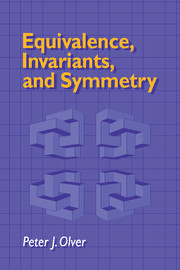Book contents
- Frontmatter
- Contents
- Preface
- Acknowledgments
- Introduction
- 1 Geometric Foundations
- 2 Lie Groups
- 3 Representation Theory
- 4 Jets and Contact Transformations
- 5 Differential Invariants
- 6 Symmetries of Differential Equations
- 7 Symmetries of Variational Problems
- 8 Equivalence of Coframes
- 9 Formulation of Equivalence Problems
- 10 Cartan's Equivalence Method
- 11 Involution
- 12 Prolongation of Equivalence Problems
- 13 Differential Systems
- 14 Frobenius' Theorem
- 15 The Cartan–Kähler Existence Theorem
- Tables
- References
- Symbol Index
- Author Index
- Subject Index
1 - Geometric Foundations
Published online by Cambridge University Press: 05 August 2012
- Frontmatter
- Contents
- Preface
- Acknowledgments
- Introduction
- 1 Geometric Foundations
- 2 Lie Groups
- 3 Representation Theory
- 4 Jets and Contact Transformations
- 5 Differential Invariants
- 6 Symmetries of Differential Equations
- 7 Symmetries of Variational Problems
- 8 Equivalence of Coframes
- 9 Formulation of Equivalence Problems
- 10 Cartan's Equivalence Method
- 11 Involution
- 12 Prolongation of Equivalence Problems
- 13 Differential Systems
- 14 Frobenius' Theorem
- 15 The Cartan–Kähler Existence Theorem
- Tables
- References
- Symbol Index
- Author Index
- Subject Index
Summary
The study of symmetry groups and equivalence problems requires a variety of tools and techniques, many of which have their origins in geometry. Even our study of differential equations and variational problems will be fundamentally geometric in nature, in contrast to the analytical methods of importance in existence and uniqueness theory. We therefore begin our exposition with a brief review of the basic prerequisites from differential geometry which will be essential to the proper development of our subject. These include the definition and fundamental properties of manifolds and submanifolds, of vector fields and flows, and of differential forms. Even though most of our concerns will be local, nevertheless it will be extremely useful to adopt the coordinate-free language provided by the geometric framework. The advantage of this approach is that it frees one from excessive reliance on complicated local coordinate formulas. On the other hand, when explicit computations need to be done in coordinates, one has the added advantage of being able to choose a particular coordinate system adapted to the problem at hand.
Manifolds
A manifold is an object which, locally, just looks like an open subset of Euclidean space, but whose global topology can be quite different. Although most of our manifolds are realized as subsets of Euclidean space, the general definition is worth reviewing. Although almost all the important examples and applications deal with analytic manifolds, many of the constructions are valid for smooth, meaning infinitely differentiable (C∞), manifolds, and it is this context that we take as our primary domain of exposition, restricting to the analytic category only when necessary.
- Type
- Chapter
- Information
- Equivalence, Invariants and Symmetry , pp. 7 - 31Publisher: Cambridge University PressPrint publication year: 1995



